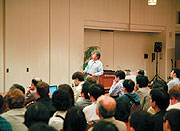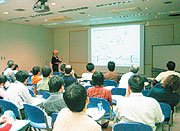RIKEN BSI Retreat 2006
For three days at the end of October 2006, BSI researchers and invited guests gathered in the woodlands of Japan for the ninth RIKEN BSI Retreat. Here, away from the bench, researchers from different laboratories and disciplines could meet, discuss, and learn about new directions being taken in other BSI laboratories. This Retreat has fostered a large number of revolutionary ideas and helped launch some interesting collaborative projects.
This year 367 researchers, including those from the Picower Institute for Learning and Memory of MIT, gathered from October 30 to November 1. They participated in poster sessions and discussion as well as listened to lectures from peers and from famous researchers, including Prof. Susumu Tonegawa of RIKEN-MIT Neuroscience Research Center and Prof. Stephen G. Lisberger of the University of California, San Francisco (UCSF).
RIKEN-MIT Joint Workshop
A RIKEN-MIT Workshop was held on November 2, 2006 at BSI to provide younger researchers at RIKEN BSI and MIT with the chance to meet and develop new skills.
This was the fourth workshop of its kind and featured lectures by Morgan Sheng and Yasunori Hayashi, both lab heads of the RIKEN-MIT Neuroscience Research Center. From BSI, Kathleen Rockland and Hajime Hirase spoke. Lectures introduced tips for effective presentations as well as the latest techniques in brain science research. During lunch, researchers from the two organizations, the lecturers and BSI laboratory heads were able to talk about matters related to research internationally.
Researcher Training Agreement with the Karolinska Institute
RIKEN and the Karolinska Institute (KI) concluded a comprehensive agreement to promote research collaboration in biological and medical research between the two organizations. In the agreement, BSI affirms its commitment to foster more cooperation between researchers and postgraduate students working at the two organizations by promoting joint projects in brain science.
KI would be able to confer academic degrees on qualified participants who complete the training program. Any BSI member could earn an academic degree by pursuing a project that involves laboratories belonging to BSI and KI. Following course work and the successful evaluation of the student's work by a jointly staffed examination committee, the student would be given a degree in medicine from KI.







